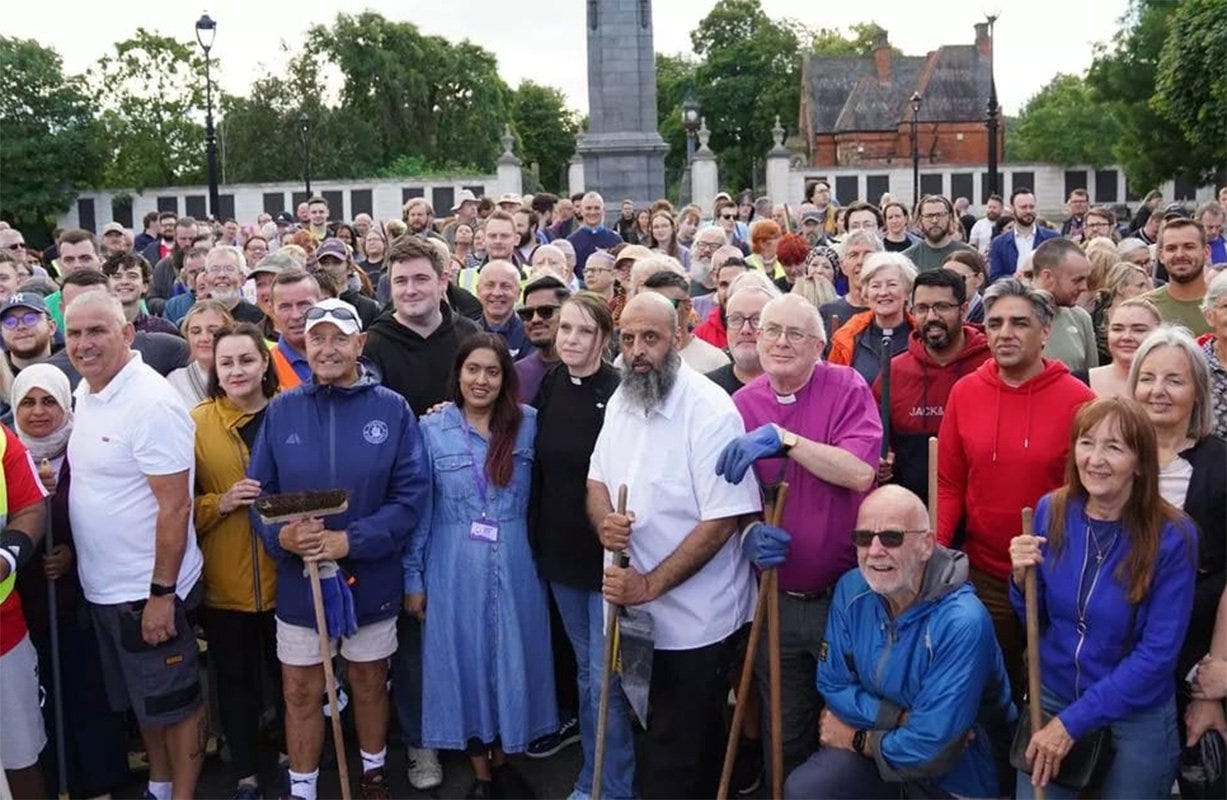Britain isn't broken
We have our problems but the doomerism is getting out of hand
Local residents arrive to clean up after the riots in Middlesborough last year
As the author of a book about the UK called “Failed State” it might see a little hypocritical for me to complain about doomerism. But as I said in the introduction to that book I’m not a declinist. Our problems are nowhere near as bad as previous moments in our history, and there are solutions if we’re willing to pursue them.
Our two core issues are low productivity growth which, combined with a series of expensive crises, has left us with a difficult fiscal situation, and the creaky, overcentralised, system of governance that was the focus of my book. These both have a knock on effect across the public sector. It’s frustrating but hardly terminal. Compared to the years immediately after World War Two, with much of the country in rubble and a ruined economy, or the mid-1970s with runaway inflation, blackouts and a three day week our troubles are small scale.
But spend a little while scrolling through X, or reading a right-wing paper, and one would think Britain was on the brink of civil war, with endless warnings of imminent ethnic conflict and a tidal wave of violent crime. Last week one of the Telegraph’s resident apocalypse correspondents Alison Pearson took to wondering when there would be a military coup to save us from the hell in which we live. Nigel Farage made a speech warning about “societal collapse” and “civil disobedience on a vast scale” in protest at immigration and crime. The Government are not being quite so hyperbolic but have been briefing about society “fraying at the edges” and the risk of more riots. Last month, culture minister Lisa Nandy talked about her concerns that the North would “go up in flames”.
It's true that there’s plenty of anger around and it is likely that we’ll see further protests this summer along the lines of those in Epping over the past few weeks. Some of these could turn violent. But summer riots, even if they happen, are hardly a new phenomenon. We saw them in 2001 in various northern cities following racial tensions, and in 2011 after the police shot Mark Duggan. The 2011 riots led to 3.5 times as many arrests as last year’s. In each case the damage has been done by fairly small groups catching the police by surprise and violence has been contained within a few days.
The vast majority of Brits, regardless of political views, wouldn’t go anywhere near a violent riot. 72% of people thought the sentences for those convicted of rioting last year were either fair or not harsh enough and an even larger percentage said the rioters don’t speak for them. 87% said the people who cleaned up after the riots represent “the real Britain” compared to the rioters, one of the highest percentages I’ve seen on any poll.
Britain isn’t on the verge of civil war but the relentless doomerism is damaging nonetheless. For a start some of it, particularly from the radical right, is clearly designed to encourage violence and disorder. But it also stops us focusing on the real, more boring, problems of debt and governance. And it can be self-fulfilling even for those who wouldn’t dream of rioting. People’s perceptions of crime, migration, social cohesion and the economy can be warped by unending negativity, which then makes things worse. Public confidence really matters. So for the rest of this post I’m going to go through each of these policy areas in turn and look at the real picture, rather than the dystopian fantasies. In each case I’ll take a balanced perspective, without pretending there are no challenges, and suggest some of the things that government could do to boost confidence.
Keep reading with a 7-day free trial
Subscribe to Comment is Freed to keep reading this post and get 7 days of free access to the full post archives.


